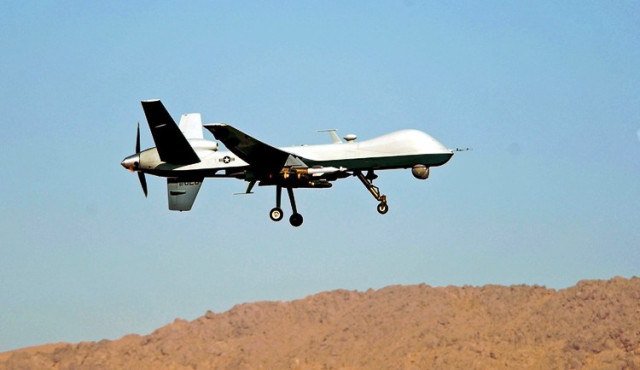Drones and terror sanctuaries
What is bound to further complicate and already complex issue is the government’s plan to talk peace with the Taliban.

What is bound to further complicate and already complex issue is the government’s plan to talk peace with the Taliban. PHOTO: AFP/FILE

That said, it would be fair to agree with the assessment that drone strikes by one country on another country’s territory are indeed a violation of the latter’s sovereignty. In the eyes of international law, they would be considered illegal as well, particularly when the country on whose territory the strikes are being carried out has publicly protested and asked for them to be ceased. The UN High Commissioner for Human Rights at a meeting earlier this year, said of drones: “The current lack of transparency surrounding their use creates an accountability vacuum and affects the ability of victims to seek redress.” This has a specific relevance to Pakistan where civilian deaths associated with drone strikes are of particular concern and the matter is very opaque with even the government not making public any figures regarding those who are killed who are not militants or high-value targets.
Pakistan’s moral position is, however, compromised somewhat because the other side to this argument also holds water. This says that Pakistani soil is used by militants and terrorists to plan, launch and carry out attacks on other countries and that the presence of such elements is nothing less than a violation of Pakistan’s sovereignty. After all, it is an open secret that many such outfits are indeed present in the country’s northwest, in particular in Fata, where the state’s writ runs very thin. This argument posits further that the strikes would not happen if a) the government of Pakistan were to go after the militants in the safe havens on its own and b) if they were not carrying out acts of terror on other countries. Our advice to the Government — and the military — of Pakistan would be that instead of taking the issue to the United Nations (which as explained above will not achieve much), it would be far better to eliminate the safe havens and sanctuaries on Pakistani soil and which are being used by militants to carry out attacks on other countries.
What is bound to further complicate and already complex issue is the government’s plan to talk peace with the Taliban because that is likely to send a signal to the militants ensconced in the sanctuaries that they have nothing really to worry about as far as the state of Pakistan is concerned. Instead of tackling the terrorists who have killed thousands of its soldiers, policemen, paramilitary troops, and ordinary civilians, the state has indicated its complete willingness to talk to a side which in the past did not honour a single peace deal, and which used each one to consolidate, regroup and expand its activities against Pakistan. Hence, it is unlikely that drones strikes are going to cease anytime soon.
Published in The Express Tribune, September 14th, 2013.
Like Opinion & Editorial on Facebook, follow @ETOpEd on Twitter to receive all updates on all our daily pieces.















COMMENTS
Comments are moderated and generally will be posted if they are on-topic and not abusive.
For more information, please see our Comments FAQ